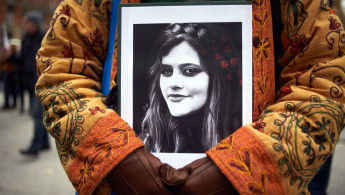EU imposes wave of new Iranian sanctions amid ruthless crackdown on protesters
The EU on Monday placed 37 more Iranian officials and entities on an asset-freeze and visa-ban blacklist over Tehran's bloody crackdown on protesters.
The bloc targeted the minister of sports and the command of the Revolutionary Guards in 12 regions of Iran in its fourth round of sanctions over the repression of demonstrators, the EU's official journal said.
Hard-line lawmakers, senior state media officials and the head of the body setting the country's strict "morality" rules were also added to the list.
The EU has already imposed sanctions on more than 60 Iranian officials and entities over the crackdown on protestors, including the "morality police", Revolutionary Guard Corps commanders and state media.
But the 27-nation bloc has so far stopped short of blacklisting the Revolutionary Guards themselves as a terror group despite calls from Germany and the Netherlands to do so.
Iran has warned the bloc against taking the move and EU officials are wary that it could kill off stalled attempts to revive the 2015 deal on Tehran's nuclear programme being mediated by Brussels.
EU foreign policy chief Josep Borrell insisted that there needed to be a legal ruling in an EU member state first before the bloc could make the move.
"You cannot say: 'I consider you a terrorist because I do not like you'," Borrell said.
"It has to be done when a court of one member state issues a legal statement, a concrete condemnation."
Demonstrations have swept Iran since the September 16 death in custody of Iranian Kurdish woman Mahsa Amini, 22, after her arrest in Tehran for allegedly failing to adhere to the Islamic republic's strict dress rules.
Iran has arrested at least 14,000 people in the wave of protests, according to the United Nations.
Iranian authorities have executed four people for their role in the unrest and imposed the death penalty on a total of 18, triggering widespread international outrage.
The foreign ministers of France and Belgium urged the bloc to confront the issue of Iran's detention of EU citizens, seen as "hostage-taking" by rights groups and families of those detained.
"I think it is time that we Europeans think about how to respond to this policy of state hostage-taking that Iran is now practising," French minister Catherine Colonna said.
"This must be taken into account in our thinking and in the decisions we will have to take in the future."
Brussels is pushing for the release of Belgian aid worker Olivier Vandecasteele, who has been sentenced to over 12 years in jail and flogging on "espionage" charges decried by UN experts.
France said last week that it is "extremely worried" about the health of a French-Irish citizen Bernard Phelan held in Iran since October.
Around two dozen foreigners and dual nationals are detained in Iran.





 Follow the Middle East's top stories in English at The New Arab on Google News
Follow the Middle East's top stories in English at The New Arab on Google News


